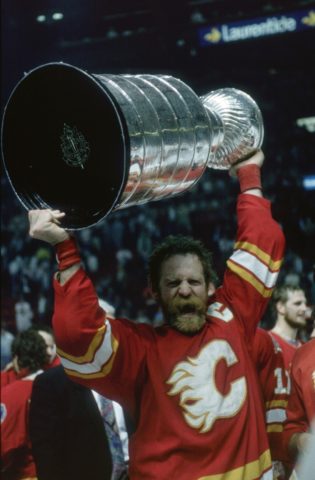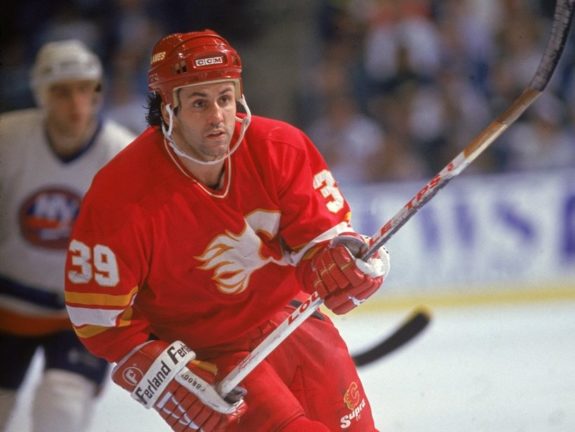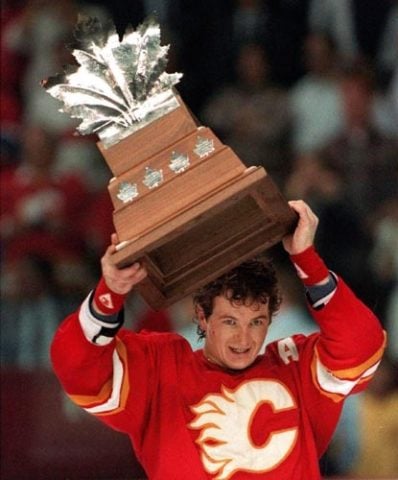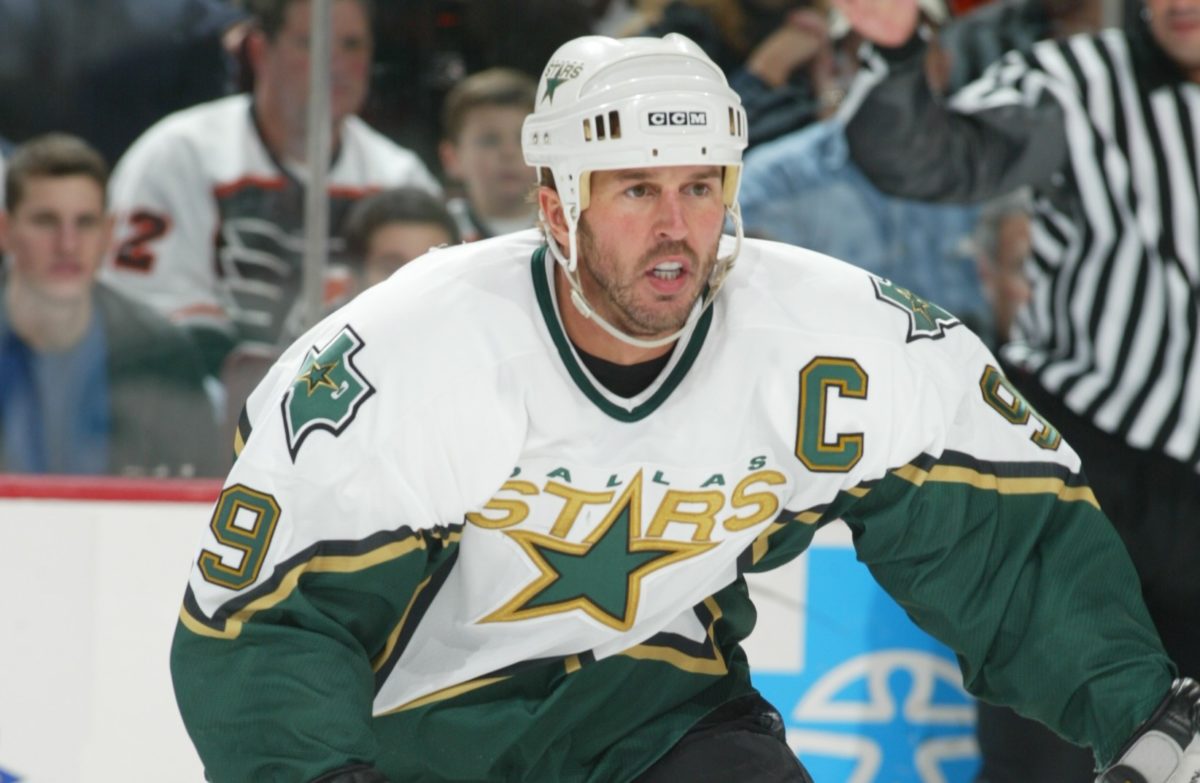The ’12 Days of Christmas’ is a classic holiday song first published in its current form in 1908. In a nod to the classic carol, join The Hockey Writers as we count down the 12 Days of Hockeymas. Each day, we will provide you with a piece of hockey history as we eagerly await the start of the 2020-21 NHL season.
Over the years, there has been a lot of discussion about the Original Six, the franchises that launched the modern era of the National Hockey League. Any hockey fan can tell you about these six historic institutions, but I’m here to bend your ear about another very exclusive NHL club with six teams – and I’ll bet you a dollar you’ve never heard of it.

I’m talking about the Singular Six; the six NHL franchises who have a single Stanley Cup to their name: Calgary Flames, Dallas Stars, Carolina Hurricanes, Anaheim Ducks, Washington Capitals and St. Louis Blues. Yes, all of the above are ‘One-Cup Wonders’, but that doesn’t mean they aren’t deserving champions. They all went the distance, winning 16 hard-fought games in the best postseason tournament in pro sports. But, there’s one team that stands above the rest: the 1989 Stanley Cup Champion Calgary Flames.
The Flames Dominated Back-to-Back Regular Seasons Before Finally Winning the Cup
There are many reasons why the ’89 champs are a cut above the other five members of the Singular Six, starting with their NHL dominance from 1987 to 1989. Led by rookie sensation Joe Nieuwendyk, the Flames blazed through the 1987-88 regular season, racking up 105 points en route to the team’s first Presidents’ Trophy. However, the Flames could not capitalize on their league-leading regular season and were swept 4-0 by Wayne Gretzky and the eventual Stanley Cup Champion Edmonton Oilers in the second round of the playoffs.

Vowing revenge on their provincial rivals, the Flames made multiple moves to get even better – 17 players were traded, signed or dropped leading up to the 1989 Playoffs. The 1988-89 campaign started off gangbusters; the team only lost four of its first 28 games. The Flames continued this torrid pace to a 54-17-9 record and a franchise-high 117 points that secured a second consecutive Presidents’ Trophy. This impressive point total handily beats all other Singular Six regular-season point totals in their Stanley Cup season.
After a First Round Scare, the Flames Cruised to the Final
More often than not, the NHL’s winner of the Presidents’ Trophy has not gone on to win the Stanley Cup. In fact, it’s only happened eight times in the 34 years the trophy has existed. The Flames almost let their spectacular, record-breaking regular season go to waste when they barely squeaked past the Vancouver Canucks in their first-round series. It took the Flames overtime in Game 7 to beat a team 43 points lower in the regular-season standings, but after they finally took care of Vancouver, the rest of the journey to the Final was a relative walk in the park.

The second round saw the Flames execute their sweet revenge on #99, who had been dealt to the Los Angeles Kings during the offseason. Sure, it wasn’t quite the same as beating the Oilers, but Calgary vanquished the Kings and their tormentor Gretzky in four straight games. After a tight Game 1 that required a Doug Gilmour OT winner, the Flames outscored Los Angeles 18-8 the rest of the way.
The Flames were heavy favourites heading into their third-round series against the Chicago Blackhawks, and once again they made quick work of their opposition, winning in five games. Calgary outscored Chicago 18-8 in the series and the Flames advanced to the Stanley Cup Final for the second time in franchise history.
The 1989 Cup Final Was a Rematch of the Flames 1986 Loss to the Canadiens
The Montreal Canadiens finished the regular season just two points behind the league-leading Flames, so everyone expected a tough battle in the final series of the 1989 Stanley Cup Playoffs. Unlike the ’86 series that only lasted five games, the ’89 Cup Final was a closely contested matchup, with no game decided by more than two goals.
The Canadiens took an early 2-1 series lead after winning Game 3 in a double OT thriller. After three games, the Flames found themselves in the exact same position they were in 1986, but this time they made sure they didn’t suffer the same fate. Calgary won the next three to claim their first and only Stanley Cup.
Game 6 at the Montreal Forum saw Gilmour score the Cup-clinching goal on a power play in the third period. That made the game 3-1, but Gilmour wasn’t done yet, adding his second of the night to make it 4-2. A healthy scratch the previous three games, co-captain Lanny McDonald sealed the deal when he scored an iconic goal to help him win his first career Stanley Cup and send him into retirement in style.
The Flames remain the only visiting team to ever win the Cup in the famed Forum, making the victory even more historic. Al MacInnis posted 10 points in the final series and was named the most valuable player of the playoffs, becoming the first defenceman in NHL history to lead the postseason in scoring.

The Flames were one of the more dominant teams to ever hoist the Stanley Cup, achieving the feat in only 22 games, which also ranks near the top of their Singular Six counterparts. Only the Anaheim Ducks had a quicker path to the Cup, needing only 21 games to get the job done in 2007.
The 1988-89 Flames Were Packed with Future Hall of Famers
A staggering eight members of the ’89 Stanley Cup-winning team have been inducted into the Hockey Hall of Fame. Many Flames faithful know these names like the back of their hand: Joe Nieuwendyk, Lanny McDonald, Doug Gilmour, Joe Mullen, Al MacInnis, general manager Chuck Fletcher, goalie coach Glenn Hall and fan favourite team trainer Jim ‘Bearcat’ Murray.

That’s five roster players, which also stacks up against the the other members of the Singular Six. Only the 1999 Stanley Cup Champion Dallas Stars have more, with six roster players eventually being honoured by the Hockey Hall of Fame. However, unlike the Flames, several of the Star’s Hall inductees (like Guy Carbonneau, Brett Hull and former Flame Joe Nieuwendyk) didn’t have their best years with their Singular Six Cup-winning squad, so I’m still giving the nod to Calgary in this category.
As for the other teams, the Ducks have three Stanley Cup roster players enshrined in the Hall, but the rest of them have zero. While that’s not a great look for the 2006 Champion Hurricanes, both the Capitals and Blues won their Cups recently, so we will have to wait a couple of decades before we know how they stack up against the 1989 Flames.
The Dallas Stars a Solid Runner-up in my Singular Six Rankings
Let me be clear – none of the teams in the Singular Six were slouches. They all were either Division winners or finished near the top of their Conference en route to the Stanley Cup. But, there is only one other franchise in this exclusive club that also won the Presidents’ Trophy: the Dallas Stars.
They didn’t win it back-to-back as Calgary did, and the Stars fell short of the Flames’ 117 points, but like in 1988-89, the best team in the regular season actually won the Cup. The Stars needed only 23 games to hoist the Cup, which compares to the Flames’ 22, so why does Calgary get the nod over Dallas as the most deserving ‘One-Cup Wonder’ in hockey history?

It’s all about HOW the Stars closed out Game 6 and won their singular championship. They did it with the most controversial overtime goal in hockey history (from ‘Stanley Cup Ends in Controversy,’ Washington Post, 06/21/1999). To start the 1998-99 campaign, the NHL had increased the size of the crease in a bid to better protect goaltenders. All season, referees had been routinely disallowing goals if an opposing player was found to be in the crease. However, it seemed that rule no longer applied when the Stanley Cup was on the line and Brett Hull jammed in his own rebound past a sprawling Dominic Hasek in triple overtime.
Buffalo Sabres fans insist the Cup was stolen from them on that fateful day over 21 years ago, and that is why the Stars’ lone victory is slightly tarnished in my view. There was no such controversy when the Flames won their championship in 1989, but there are plenty of Calgary fans who feel the Sabres’ pain and insist the Flames were robbed of a second championship in 2004 when Martin Gelinas’ apparent Cup-winning goal did not count in Game 6 of the Final.

Winning Lord Stanley’s holy grail is hard – just ask the 11 NHL franchises that have never won a Cup. Membership in the Singular Six should not be seen as a failure by any stretch. That being said, after 31 years of being associated with this exclusive club, the Flames would like nothing better than to graduate to the next level – and join the four other NHL teams in the much more elusive “Two-Timers Club”.